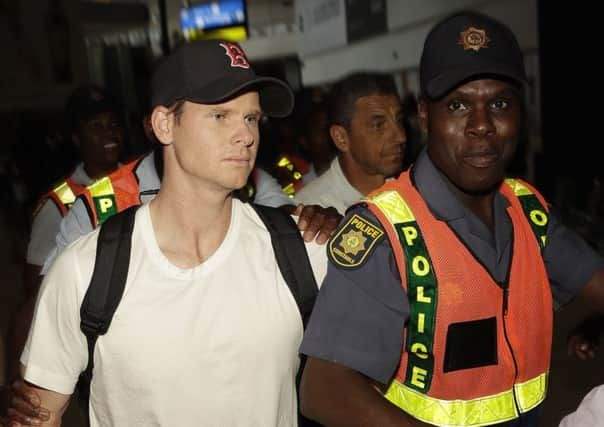12-month bans for ball-tampering ringleader David Warner and captain Steve Smith


Cricket Australia said Warner “instructed” young batsman Cameron Bancroft to carry out the tampering on the field with a piece of sandpaper – even showed Bancroft how to do it – then misled match officials and tried to cover up his role in the cheating.
Smith, the top Test batsman in the world and the star of Australian cricket, knew about the plan. But the captain failed “to take steps to seek to prevent the development and implementation of that plan”, Cricket Australia said as it released the findings of the investigation by its head of integrity that dragged in all the players, coaches and backroom staff for questioning.
Advertisement
Hide AdAdvertisement
Hide AdSmith and Warner were banned from playing for Australia, or any high-level cricket in Australia, for a year. Bancroft, maybe because of his place as an impressionable newcomer in the team, received a nine-month ban from international and provincial cricket.
The 28-year-old Smith will not be allowed to captain Australia for two years and Warner will never be allowed to hold a leadership position in Australian cricket again. At 31, Warner may never play for Australia again.
The fallout extended beyond Australia. The three players were all banned for the 2018 edition of the Indian Premier League, denying them places in the lucrative Twenty20 tournament where players are paid big money to appear.
“These are significant penalties for professional players and the (Cricket Australia) board does not impose them lightly,” CA chairman David Peever said. “It is hoped that following a period of suspension, the players will be able to return to playing the game they love and eventually rebuild their careers.”
All three were encouraged by national administrators to play low-level club cricket during their bans in an attempt to rebuild trust with the Australian public.
In terms of Smith’s future captaincy prospects, CA said that would be “conditional on acceptance by fans and the public, form and authority among the playing group”.
Underlining the extent of the damage to Australia’s reputation, the Cricket Australia bans were far more serious than punishments handed out by the International Cricket Council. The ICC banned Smith for one Test, gave Bancroft disciplinary demerit points but no ban, and didn’t even charge Warner with any offense following the tampering episode in the third Test last weekend.
Smith’s fall from grace has been sudden and steep after he captained Australia to a 4-0 Ashes rout of England a few months ago, establishing himself as the best batsman in the world with a series of outstanding performances. Now, he’s an outcast in his sport, only allowed to play club cricket for the next year.
Advertisement
Hide AdAdvertisement
Hide AdAs he left the team hotel in Johannesburg, Smith said he didn’t feel like playing any cricket right now. Wearing a white T-shirt and dark baseball cap, Smith hugged team-mate Tim Paine, who has replaced him as Australia’s Test captain before heading for the airport. Coach Darren Lehmann, who was cleared of having any knowledge of the tampering plan, fast bowler Mitchell Starc and batsman Usman Khawaja all were there to say goodbye to Smith.
The three players will return to face an outraged Australian public, which has witnessed the treasured reputation of its favourite sports team severely tarnished.
The saga could signal the end of the international career of Warner, a pugnacious opening batsman who has a series of disciplinary breaches behind him, including one earlier on the tour of South Africa when he was involved in a heated off-field confrontation with a South African player during the first test.
Warner had already been identified as the chief culprit in the plot by Australian media, which reported he had completely fallen out with his team-mates.
The ball tampering plan could be seen as being almost comical if it hadn’t destroyed reputations and possibly careers.
Tasked with doing the tampering in the game in Cape Town, Bancroft was caught in the act by television cameras and then panicked and tried to hide the piece of sandpaper he used down the front of his trousers, an action that was also caught on TV and replayed over and over in slow-motion and close-up.
Smith and Bancroft were forced to admit the plot to reporters after play in the face of the overwhelming TV evidence. In one intriguing detail, CA said that Bancroft used sandpaper on the ball to rough it up. The players originally said they used yellow sticky tape and dirt.
With Smith, Warner and Bancroft on the way home, three players had been flown out from Australia to take their places for the final Test in South Africa, which starts tomorrow.
Following a crushing 322-run loss in that ill-fated third Test in Cape Town, Australia trails 2-1 in the series and faces losing a series in South Africa for the first time in nearly 50 years.